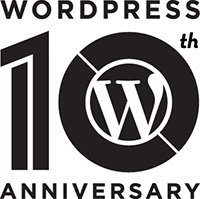Here we are, ten years after WordPress was founded.
When WordPress was created, there wasn’t many other blogging solutions, let alone any easy-to-use content management systems. Many blogging solutions were significantly under-powered and restrictive. Other content management systems were overkill for the average person or was extremely technical. WordPress succeeded because of its flexibility, performance and usability. It wasn’t trying to prove to be the fastest, or the best or the easiest. As a result, it was.
When I began blogging sometime in 2004, I was looking for a system to capture my thoughts, ideas and to riff on technology. Yes, I started on LiveJournal like every other person at the time with teenage angst. Then I ‘graduated’ up to Google’s Blogger service, since their acquisition from Pyra Labs seemed promising. I found myself blogging a few weeks there and I grew frustrated with the inability to customize the design of my site and was confined to the few formats selected for me.
Sometime in 2005, I made the switch to WordPress and haven’t looked back. Once I got my own Dreamhost account, I figured out how to upload the WordPress installation, create my MySQL database and connect the two together.
At the same time, I was working at AOL. If you recall, AOL acquired Weblogs Inc from Jason Calacanis. Well, I was one of the privileged users to actually use Blogsmith on the AOL network. Blogsmith is a platform that was created by Brian Alvey for Weblogs Inc. Here’s an overview from Alvey himself after he sold the platform to AOL. Don’t get me wrong — Blogsmith has some serious firepower for enterprise content producers. Even against WordPress. However, from what I’ve seen in the WordPress platform in the past two years, its UI, capabilities and performance would give Blogsmith a run for its money. (I have to think that AOL paid some serious money for it, since it was not included in the Weblogs Inc deal.)
Since then, I’ve been able to share my ideas with the world. From very long posts to the mysterious (and even annoying) Tumblr-like short posts. I’ve been able to get discovered and seen by hundreds of thousands of people every year. As a result of my efforts, my employer generates a measurable amount of revenue by using WordPress. I’m not alone. There are millions of other content producers who also use WordPress as the platform of choice for their clients.
I found (and still do find) the diversity and passion for the platform in the WordPress community unlike no other software or service. Resources, tools and freebies are frequently shared among participants. In WordPress’ terms, these resources were broken down in the form of Themes, Plugins and community support. Ever since the beginning, I found the community support to be the top reason why I choose WordPress. I also appreciate the maturity of WordPress as a platform. It’s safe, scalable and flexible. That matters.
Later, I discovered (along with many thousands of others), that WordPress is great for more projects than blogging. A desire to have one platform to manage and customize instead of two or three is valuable for people. In 2007, WordPress was responsible for serving 186 million monthly pageviews. Today, WordPress serves up over 4 billion monthly pageviews. Wow.
The WordPress community has made WordPress better and better over the years. A lot has has evolved in the past ten years. The next ten will be even more exciting. I expect the WordPress core software to expand deeper into mobile. I expect greater integrations across the like of Facebook and Twitter. I expect greater media handling and less dependency on plugins. I also expect WordPress to continue to become a target of security attacks as it becomes the content platform of choice for websites.
WordPress gives me a voice. When I am compelled to share my perspective on the world around me, beyond 140 characters, I use my WordPress-powered sites to do it. To anyone who has developed and contributed to WordPress– thank you!
Keep up on the fanfare and buzz on WordPress’ tenth anniversary on the WP10 live-blog.

